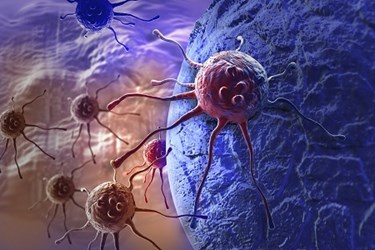Researchers Discover Possible "Off-Switch" To Halt Cancer Drug Resistance
By C. Rajan, contributing writer

Researchers at the Salk Institute have discovered the possible mechanism by which cancer develops drug resistance, and their research points towards uncovering an ‘off-switch’ to turn off this process.
The study shows how cancer cells use diversity to survive chemotherapy and become more resistant to drugs. Cancer cells within the same tumor have slight genetic variations and the researchers uncovered how these variations in breast cancer cells’ RNA help the cancer to survive and evolve.
“It’s an inherent property of nature that in a community – whether it is people, bacteria or cells – a small number of members will likely survive different types of unanticipated environmental stress by maintaining diversity among its members,” says the senior author of the new work, Beverly Emerson, professor of Salk’s Regulatory Biology Laboratory. “Cancer co-ops this diversification strategy to foster drug resistance.”
The study’s lead author Dr. Fernando Lopez-Diaz and his team tried to uncover the diversification “switch” by which cancer cells replicate while maintaining slight variations amongst themselves. Turning off this cellular process would make the cancer unable to survive drug treatment.
In the study, Lopez-Diaz treated human pre-cancer and metastatic breast cancer cells with the standard cancer drug paclitaxel in a similar manner to the actual treatment cycle for a cancer patient. He found that the surviving cells began to replicate but with subtle changes in their RNA, which made them resistant to more doses of the cancer drug.
The researchers collaborated with the bioinformatics team at University of California, Santa Cruz to study over 80,000 pieces of RNA per new cancer cell in order to distinguish the subtle differences between several generations of cancer cells treated with chemotherapy.
The researchers found that the cancer cells maintained the same gene expression patterns after surviving chemotherapy. Emerson believes that this adaptive behavior helps the cancer cells prepare for the next unanticipated threat.
The researchers also found that a large number of precancerous cells survived chemotherapy and proliferated, more so than either normal or cancerous cells. As a result, once the pre-cancerous cells became a tumor, they became more drug resistant.
“The pre-cancer cells, when exposed to chemotherapy, evolved much faster and create a more drug-resistant state,” says Lopez-Diaz. “This and other findings can now be explored into greater detail using the knowledge and perspective we have gained here.”
The study is published in the Proceedings of the National Academy of Sciences titled, "Single-cell analyses of transcriptional heterogeneity during drug tolerance transition in cancer cells by RNA sequencing."
